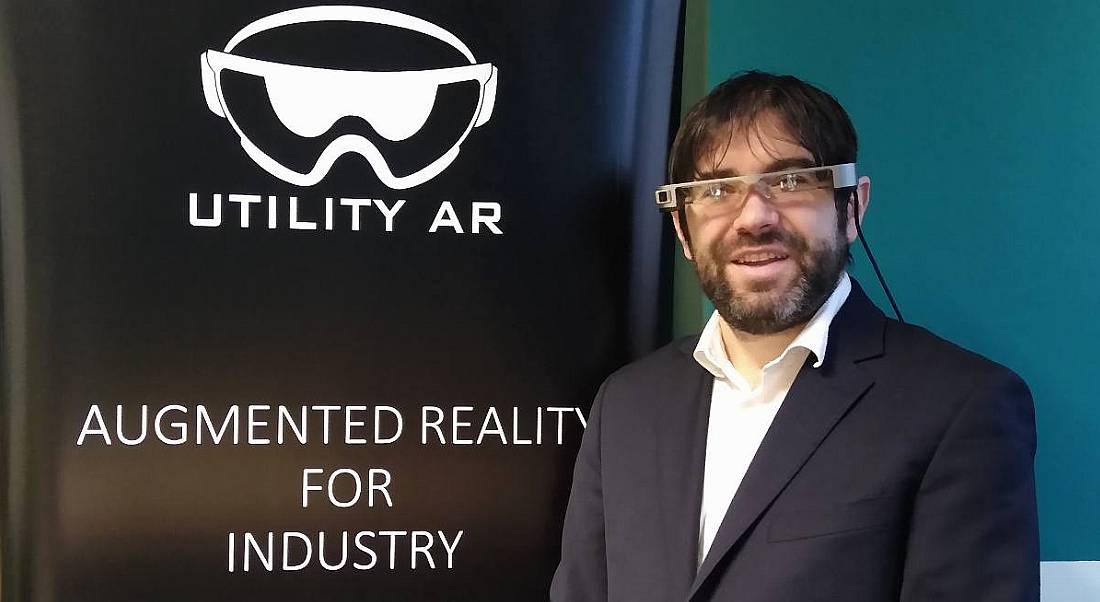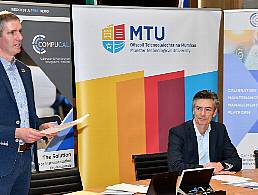Patrick Liddy of UtilityAR explains how he applied his knowledge of agriculture when setting up his own business.
Patrick Liddy first became acquainted with idea of being your own boss when he helped his dad on their family farm as a child. He didn’t anticipate becoming an entrepreneur, but today, he is the co-founder of UtilityAR, an augmented reality (AR) software company that offers AR integration solutions to businesses.
Through his company, Liddy’s ambition is to help less experienced people enter the workforce while “improving our society’s ability to deploy the technology required to fight climate change, reduce social exclusion and improve the lives of all people”.
‘If you look closely, you will see the similarities in Ireland between having agricultural roots and running a business’
– PATRICK LIDDY
What was your first experience of AR? How did you come across it?
I attended a virtual reality (VR) meetup which was held in Cork a few years ago. There was an executive from Daqri – a now-failed but well-funded headset manufacturer – showing off their kit. It seemed immediately obvious to me that AR was far more useful and would be ready for adoption far quicker than the VR we saw that day.
It was from that meetup I realised – similar to how the internet has changed the way we act in our day-to-day lives – this technology would change how we interact with computers. I had missed the first wave of the internet – I didn’t want to miss this opportunity.
What do you see as the potential benefits of AR to employers and workforces of the future?
The technology is helpful to employers as it digitises work which is currently not captured by computers and laptops. The form factor of smart glasses means that a worker has their hands free to get their job done while also having the forward-facing camera to validate what they are doing.
The immersive nature of AR means that they can better visualise what they are doing and the information can be presented in a more sensible way than what can be achieved by our current devices.
These improvements offer better speed and quality of work, while also reducing stress by providing better information – exactly when it is needed.
Has your own career journey been straightforward?
Not at all. I did engineering in UCD. I won’t say I studied it, because that would be very untrue. Like many third-level students in Ireland, I entered college not knowing exactly what I had signed up for and left not much more informed!
After college, I worked in a selection of different jobs, but gradually began to understand that it was energy and technology that I was interested in. My first business, Activation Energy, focused on energy efficiency and using IoT metering and monitoring equipment to make the electricity system more efficient.
This business aimed to help deploy and maintain similar equipment to improve efficiency and help things run smoothly. From that, I entered the business of AR and UtilityAR was born.
How did you transition from your farming background to co-founding a company?
Farmers represent the largest cohort of entrepreneurs in Ireland. Each runs his or her own business and, over time, needs to make the changes required to modernise and keep up to date.
Currently, Ireland has among the most technically advanced agricultural sectors in the world.
When I was helping my dad run the farm in the late ’80s and early ’90s, I saw the benefits and challenges of being your own boss.
I didn’t think I would become an entrepreneur – I don’t think I knew the word at that time – but if you look closely, you will see the similarities in Ireland between having agricultural roots and running a business.
What have been the major challenges for you in that transition?
Founding a company where there are salaries to pay and customers to satisfy is extremely stressful and the work never ends. In that way, though, it is similar to where I came from.
Selling is the biggest difference. This company – as well as my previous one – requires sales and marketing, which means focusing on your product and exploring customer needs. [These are] not issues when it comes to milk or beef.
We are exhibiting at the Northern Ireland Manufacturing & Supply Chain Conference & Exhibition. Join us at stand C28.#Manufacturingexponi #augmentedreality #manufacturing #innovation pic.twitter.com/BQLeohesIQ
— UtilityAR (@UtilityAR) February 27, 2020
What has been the most rewarding part for you?
I wouldn’t describe my work as rewarding. Entrepreneurs need to do what they do, like a smoker needs a cigarette.
I see a problem and can’t help but focus my attention on finding a solution. If my efforts are successful, I am satisfied – until I notice the next problem!
Do you have any advice for someone who wants to start a business?
My only two pieces of advice are to, firstly, do the research. It often happens where people will talk about their business idea, and from the conversation it is clear that they haven’t even Googled to see if there is already a similar solution available. Do your research, talk to customers, do the basics.
Secondly – start. You can’t succeed – or fail, or learn – unless you start formulating your idea. Nobody is going to do it for you.
Are there any resources on AR you would recommend?
I’d suggest reading a book called Rainbows End by Vernor Vinge. It is a sci-fi novel written in 2006 that describes various futuristic technologies, including AR.
Looking at it now, you will begin to see that it is very plausible and possibly our near future. You may also be able to draw inspiration from it – I know I did.




